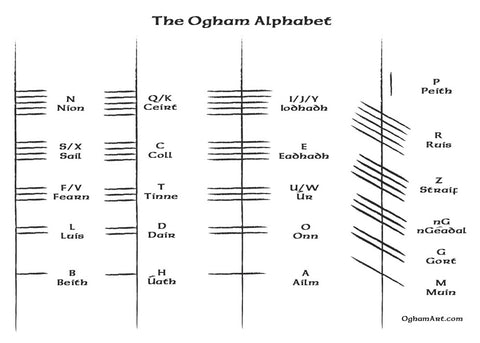Welcome (Fáilte) Slate Plaque
Greet your friends and family with a touch of Celtic history. Each slate plaque is hand-painted in a classic combination of green and gold tribal shadowing. All plaques are treated and sealed before and after the painting process to encourage vibrant longevity.
5.25" x 11.75" slate ready-to-hang with drilled holes and leather strap. Includes a descriptive 4x6 card explaining the history of the Ogham alphabet. Slate plaques can take up to 2 weeks to create.
Ships within 2 weeks. USPS shipping times are in addition to this handling period.
Here is a brief summary of the Ogham alphabet. Stay tuned for more detailed posts in the days to come. Sign up below for the Ogham Art Newsletter to receive email notifications about new postings, blogs, products and events.
Sláinte,
Colleen & Chris
Ogham is the earliest written form of Primitive Irish, the oldest of the Gaelic languages. Ogham was first used in Ireland and parts of England, Scotland and Wales between the 2nd and 6th centuries. Though its actual origins remain a mystery today, it is believed the Celts desired a cryptic alphabet that could not be deciphered by Roman Britain.


Represented as a series of perpendicular and intersecting lines, this ancient script is thought to be influenced by the Latin alphabet using 20 characters. It is most commonly written vertically and is read from bottom to top. When presented horizontally, it is read from left to right.








